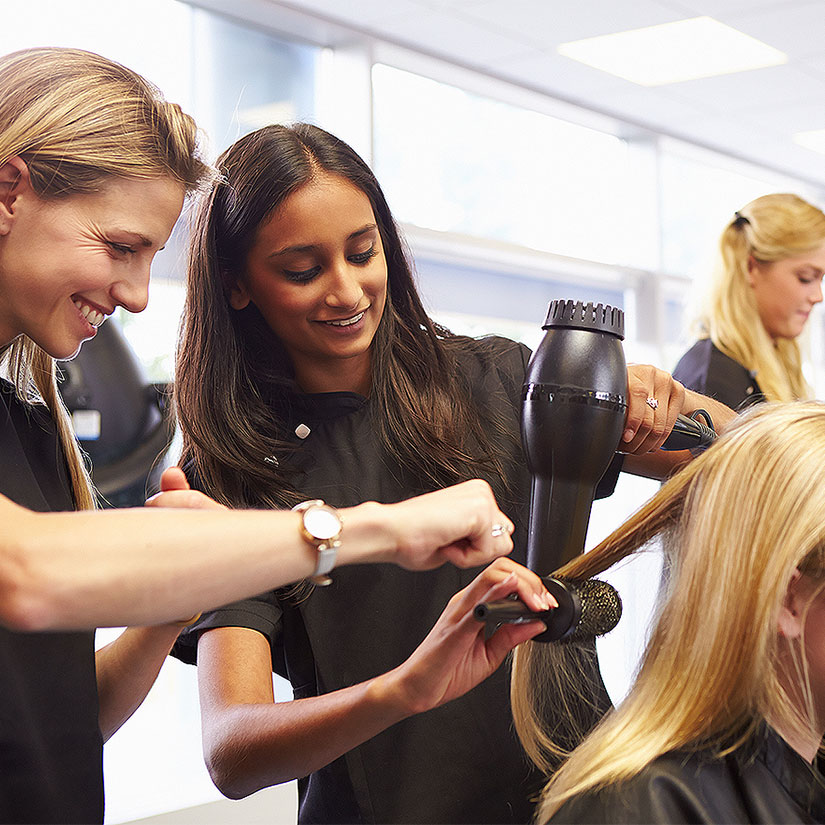Have you been thinking about going to makeup school?
A career in beauty can be exciting, fulfilling, and oh so gorgeous. In this insider’s guide to makeup school, let’s cover the basics of how to get your education in makeup, types of makeup careers of professional makeup artists.
1. What Does It Take to Be a Makeup Artist?
Getting your certification as a makeup artist can open doors. For new graduates, graduating school as a makeup artist can help you get clients, jobs, and your foot in the door. However, studying makeup has many aspects to it.
First, there’s the actual makeup application. If you’re considering makeup school, you probably already have a knack for applying makeup, but through makeup training, you’ll learn and practice new and exciting approaches. For example, you’ll learn about adjusting to skin tones, skin types, and creating beautiful looks for all ages.
Next, there’s the creative side. As a makeup artist, you’ll be working with color, style, and face shape to create beautiful looks. The most creative of makeup students push the envelope with expressive and cutting-edge styles.
Professional makeup artists also have good people skills. In the beauty business, you’ll need to be able to listen to what the client wants and communicate any suggestions clearly. Frequently, good communication helps you have happy clients.
2. What Are the Types of Makeup Courses?
The Esthetics Program at Tricoci University includes classroom training, hands-on practice in a student salon, and business classes.
Makeup courses start with the foundations of skin care, including skin science, treatments to improve skin tone, and creating a healthy canvas for makeup application. Additional spa treatments are taught, including facial massage, microdermabrasion, and chemical peels. Makeup application courses build upon this knowledge, helping you to understand how to achieve the looks you want. Plus, business classes teach you about marketing and sales, as well as safety and sanitation practices.
3. How Should You Prepare for Makeup School?
Whether you’re attending makeup school immediately after high school, or are deciding to become an MUA later in life, your preparations will be the same.
First, take a look at the admissions process for getting into a good Esthetics school. At Tricoci University, there’s a minimum age requirement, and the only prerequisite is that students have a high school diploma or GED.
Next, review what financial aid the makeup schools near you offer. Because at 16 of the campuses at Tricoci University have been approved by the U.S. Department of Education, students are eligible for federal student aid, including grants and loans. Plus, beauty scholarships can help you to get even more help to attend makeup school.
4. How Long Is Makeup School?
The length of time that students attend makeup school will vary based upon the curriculum.
Tricoci University’s Esthetics Program for professional makeup artists and estheticians is 750 hours of study. Full-time students can graduate in as little as six months, and part-time students can complete the program in as little as nine months.
5. What Are Fun and Interesting Areas of Makeup Artistry?
There are so many exciting areas of makeup artistry to explore, including the following:
- Makeup Trends: What’s next in makeup? See for yourself by attending fashion shows, looking for niche cultural movements, and watching for trends in fashion districts such as Paris or Milan.
- Makeup and Gender: As the conversation about gender has become wider, the new role of makeup and gender is poised for exploration.
- Makeup Science: If you have a knack for chemistry or cooking, studying the science of makeup can be an interesting way to discover product interactions, blend your own formulas, or to explore all-natural products.
- Zombie Makeup: The specialized makeup artists of The Walking Dead may have set the standard for undead style, but zombie special effects makeup has become a category of its own.
- Makeup Psychology: As a makeup artist, you help people feel beautiful. This perception of beauty can be an important part of salon culture.
6. What Are Your Career Opportunities as a Professional Makeup Artist?
It’s a strong job market for makeup professionals. The U.S. Bureau of Labor Statistics estimates that in the next decade, there will be 8 percent job growth, which is faster than average.
Consider some of these diverse career options for students who attend makeup college:
- Salon and Spa Makeup Artist: As a staff makeup artist, you’ll have a diverse range of clients. This can include regulars, guests who are combining hair and makeup treatments, and guests who want their makeup done for a special event.
- Bridal Makeup Artist: To look perfect on the big day, both the bride and the bridal party often use a special makeup artist to get their looks just right.
- Celebrity Makeup Artist: If you want to work with high-profile clients, a job as a celebrity makeup artist may give you a chance to create those red-carpet looks.
- Makeup Educator: The Esthetics Teacher Program at Tricoci University teaches students how to become teachers so that they can work at a makeup school.
- Screen and Stage Makeup Artist: Work as a makeup artist on movies, TV, and in the theater. If you’re interested in the film industry, consider building connections to filming hot spots such as Los Angeles, Atlanta, Chicago, and New York.
- Special Effects Makeup Artist: As an SFX makeup artist, you can create interesting illusions ranging from the fantastical to the gruesome, and there’s subtle makeup artistry such as altering someone’s age.
- Runway Makeup Artist: These trendsetters are on the cutting edge, helping to create looks that complement a designer’s aesthetic.
- Makeup Brand Agent: When you work with a makeup brand, either in a department store or as an online ambassador, you’ll combine your makeup application knowledge with your sales and people skills.
Learn more about how attending makeup school can launch your career in beauty.





